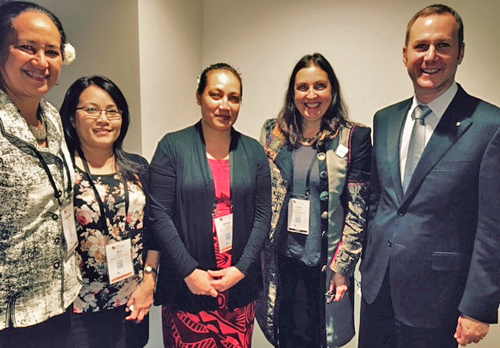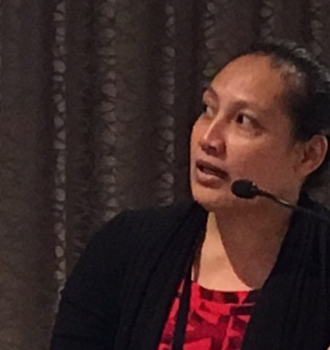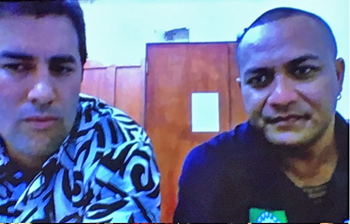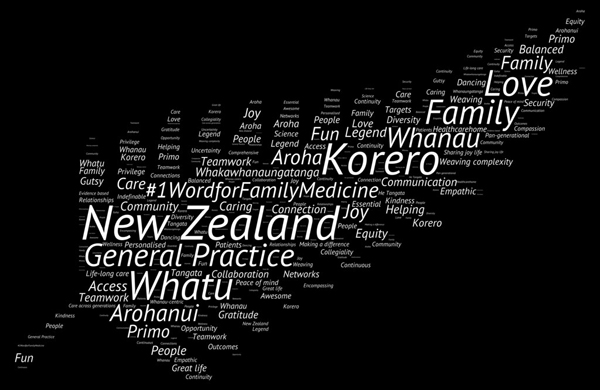From the President Pioneering Family Medicine Training in the South Pacific
 Photo: Trainees in the Cook GP Fellowship program, Mareta Jacob and
Nini Wynn, with WONCA President, Michael Kidd, Secretary of Health for
the Cook Islands, Elizabeth Iro, and President of the Australian College
of Rural and Remote Medicine, Lucie Walters.
español français
Photo: Trainees in the Cook GP Fellowship program, Mareta Jacob and
Nini Wynn, with WONCA President, Michael Kidd, Secretary of Health for
the Cook Islands, Elizabeth Iro, and President of the Australian College
of Rural and Remote Medicine, Lucie Walters.
español français
The island nations of the South Pacific Ocean are among the most remote communities on earth.

Dr Mareta Jacob is a medical graduate family doctor trainee in the Cook Islands in the South Pacific. Mareta is changing health care in her nation as the first person to enrol in the new Cook Islands Fellowship in General Practice training program. Mareta is training to become the Cook Island’s first family doctor.
Photo: Dr Mareta Jacob describes her work as a family doctor in the Cook Islands.
The Cook Islands comprise 15 islands with a population of 15,000 people, the majority living on the main island of Rarotonga. In the past medical services have been provided to the people of the Cook Islands by medical officers based in hospitals, rather than in the community. Medical practitioners in the Cook Islands face the challenges of geographic and professional isolation with limited resources to support their work.
The Cook Islands Fellowship in General Practice training program aims to create a workforce of well-trained family doctors to serve the future health care needs of the people of the Cook Islands, and is part of a wonderful collaboration between the Ministry of Health and the Ministry of Education in the Cook Islands, the Royal New Zealand College of General Practitioners (RNZCGP) and its Division of Rural Hospital Medicine, and New Zealand’s University of Otago.
Mareta started her medical education as a medical student at the famous Fiji School of Medicine, which has been training health care professionals from the island nations of the South Pacific since its establishment in 1885. Since graduating as a doctor, and before enrolling in the new Cook Islands Fellowship in General Practice training program, Mareta has been working in the Cook Islands as a medical officer doing outpatient and emergency work.
The new training program comprises a one-year postgraduate diploma in rural hospital medicine and general practice with The University of Otago, followed by three years of supervised clinical training. As the first candidate, Mareta’s training has involved six-month clinical attachments in New Zealand, first at the rural hospital in Hokianga, and then in rural general practice in Wellsford, where she is working with RNZCGP president, Dr Tim Malloy.

Two other doctors in the Cook Islands, Nini Wynn and Teariki Puni have also joined the Fellowship Training Program and will follow Mareta.
Photo: Cook Islands family doctor trainee, Dr Teariki Puni and New
Zealand family doctor trainee, Dr Joel Pirini, joined the conference in
Auckland by videolink from Rarotonga.
Members of the RNZCGP have also been providing support to the existing health services in the Cook Islands. Over the past five years, 30 New Zealand general practitioners and rural hospital doctors have completed short-term visits to the Cook Islands to assist in building capacity and providing mentoring and clinical support to local doctors. A new family doctor registrar training post has been established at Rarotonga Hospital and Dr Joel Pirini is the first New Zealand doctor to take part in this six-month clinical placement.
This is a wonderful initiative between the Cook Islands and New Zealand to develop a home-grown primary care medical workforce for Cook Islands. Mareta, Nini and Teariki are the pioneers of family medicine in their country.
I was in New Zealand last month as a guest of the Royal New Zealand College of General Practitioners at the college’s annual conference, held in Auckland. New Zealand has long been a global leader in the development of the family medicine model in ensuring equitable and affordable health care for all people in this nation. New Zealand is also a world leader in the use of information technology to support our work in general practice.
At the conference, Dr Jo Scott Jones, a long-standing member of WONCA’s working party on rural practice, unveiled New Zealand’s contribution to the One Word for Family Medicine initiative of the young family doctor movements of WONCA. The family doctors in each country have been invited to develop an image from the words that describe the work of family doctors in their country. The New Zealand contribution has words in Maori and English, and features, the silver fern, the symbol of this nation, which reflects eternal renewal and replenishment, “when one frond dies, another frond rises to take its place”, which is an appropriate symbol for our never-ending contributions as family doctors to each of our nations.
 “One Word for Family Medicine” from New Zealand
“One Word for Family Medicine” from New Zealand
Michael Kidd
WONCA President